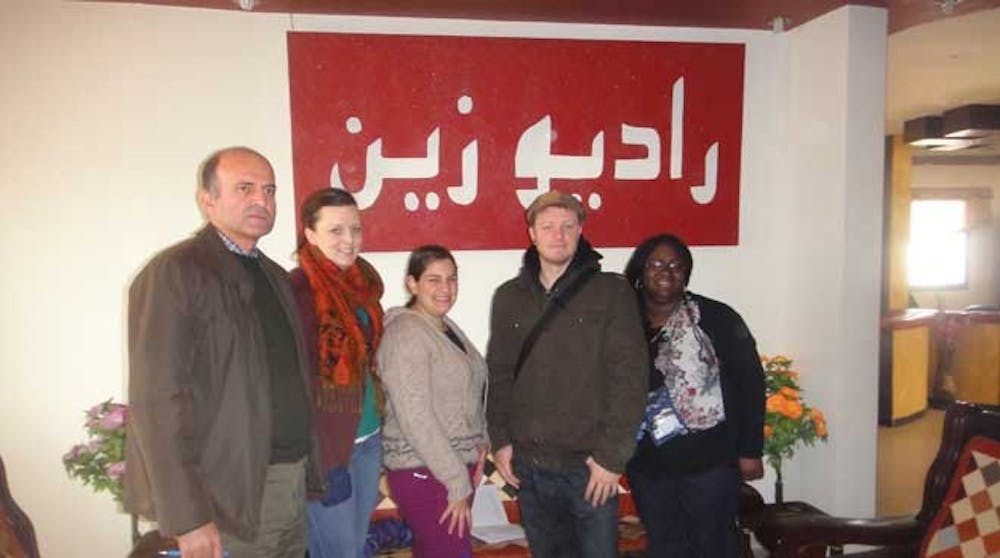Melissa Diamond, a junior, is taking this semester off from academic work to start a therapy program for children with autism in Jenin, a city in the West Bank. Diamond is the director and founder of A Global Voice for Autism, an organization that provides services for children with autism in communities around the world where these services were not previously available. The Jenin Autism Project is A Global Voice for Autism's first training program.
"I chose to begin the program in Palestine because this is where I discovered the need," Diamond said. "Once you know about something, you can close your eyes to the issue, but you can never revoke that knowledge."
Diamond said she had developed the idea for A Global Voice for Autism in May 2012 after visiting the Princess Basma Center for Disabled Children in East Jerusalem as part of a pilgrimage trip to Israel with the Office of the Chaplaincy. At the center, she learned about the difficulties that families who have children with autism face in finding treatment services in the West Bank.
"I think that she just saw the need," said Rabbi Andrew Goodman, the director of Jewish life at University of Richmond, who accompanied Diamond on the pilgrimage to Israel. "I think she wasn't able to just sit knowing that this is happening."
Children in these territories do not have access to the Israeli medical system. To receive treatment, they must apply for a Tazrih (a travel pass similar to a visa) to go to Israel for up to three weeks, Diamond said. Families must be able to afford to travel and to have a parent leave home for an extended period of time to accompany his or child.
"Even when families can afford to travel to the center, the fact remains that autism treatments are intended to be implemented for at least a year, and three weeks is nowhere near enough time to make a difference in the lives of these children," Diamond said.
She said after meeting people who were suffering from the lack of autism services available in the West Bank, she could not wait until after graduation to start this project.
"I think Melissa feels very devoted to these causes of social justice," said Tom Mullen, a journalism professor who has taught Diamond and supported her idea for the program since its early stages. "That devotion is characterized by an immediacy rather than waiting for other people to be involved."
After receiving a $9,000 grant from the Resolution Project at the Clinton Global Initiative conference, hosting a fundraiser and launching crowd-sourced fundraising websites, Diamond raised enough money to launch an autism therapy program in the West Bank. Trefor Lloyd, a British psychologist who has researched the high prevalence of autism in the Jenin community of the West Bank, saw one of Diamond's fundraising websites and contacted her about launching her program in Jenin.
Diamond created a team of two applied behavior analysis therapists and two board-certified behavior analysts to travel with her to Jenin for three months to start their program at the Jenin Cultural Center, she said. Diamond and her team not only provide autism training and skill workshops for the children, but they also lead support groups for siblings and train the mothers in Applied Behavior Analysis (ABA).
Diamond said she and her team planned to leave Jenin on March 31, putting the mothers in charge of the program. The mothers will work with one another's children for training sessions and will also be equipped to teach the skills that they have learned to new mothers entering the program. Diamond said she and her team would continue to communicate with the mothers and offer feedback after they leave.
Diamond said she planned to return to Richmond in the fall and graduate in May 2015. She said after graduation, she hoped to
Enjoy what you're reading?
Signup for our newsletter
continue to develop her organization so that ABA and support services can be made available to families of children with autism around the world.
"Children cannot control where they are born," Diamond said. "They cannot control their gender, race, religion, nationality or socioeconomic status, and should not be denied access to services that can enhance their quality of life and provide them methods of communication for any of these reasons."
Contact staff writer Brennan Long at brennan.long@richmond.edu
Support independent student media
You can make a tax-deductible donation by clicking the button below, which takes you to our secure PayPal account. The page is set up to receive contributions in whatever amount you designate. We look forward to using the money we raise to further our mission of providing honest and accurate information to students, faculty, staff, alumni and others in the general public.
Donate Now



